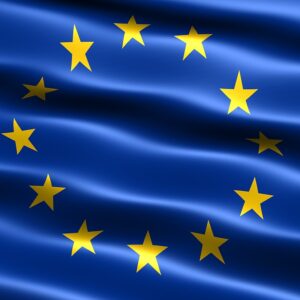As Europe is torn apart by war and the U.S. gears up for fiercely partisan midterm battles, a delegation of members of the European Parliament is in Washington to speak with members of Congress for “Transatlantic Week,” a series of meetings convened annually to find common ground on critical policy issues. And the pressure is on this year as the world looks to the West for leadership.
But the tools of diplomacy have changed since Europe last saw such upheaval. Everything we do in our lives — from how we communicate to how we access money — is determined by the ability to access a global internet and what data are allowed to move from point A to point B. That’s why cross-border data flows are a sensitive topic of debate for the U.S.-EU Trade and Technology Council, the latest trans-Atlantic forum tasked with negotiating trade and technology policies. If the global economy digital, then foreign policy needs to be digital. Just as foreign diplomacy pulled us through World War II, we need a new form of diplomacy that considers the global nature of idea sharing to usher in solutions.
Our opponents have already recognized this shift. Russia and its allies are working hard to create borders around communication through censorship and deception to virtually silence dissenting voices, especially those seeking to reach the West. They’re also going further and seeking to centralize and strengthen their virtual assets, such as pursuing policies that legalize cryptocurrencies as a means of payment. They are seeing and seizing the power of digital tools for their own manipulative gain and choking off the ability of entrepreneurs to contribute new innovations to the greater good.
I am not suggesting that the West follow this pattern of censorship and deception. However, I believe in the need to embrace the power of digital and make it easier for startups and entrepreneurs to access the tools and data necessary to grow and thrive in today’s digital economy. The focus of business can no longer be only on making a profit; it has to be on solving our most pressing problems. We must work together as trans-Atlantic partners to build a strong regulatory environment that enables the development of these solutions by allowing innovation to thrive and inviting global collaboration through data sharing agreements, immigration reforms and venture capital taxation structures that match across markets.
And we know this works. Trans-Atlantic data sharing enabled a German biotechnology company — BioNTech — to work with U.S.-based Pfizer to co-develop and distribute the first mRNA vaccine combating COVID-19. And thanks to agreements targeting the sharing of sensitive financial information, Dublin’s Stripe platform has equipped millions of businesses to collect and process payments across borders, streamlining international commerce and allowing more businesses to participate in the global market.
So as trans-Atlantic leaders gather in Washington under the shadow of war to explore solutions to our most pressing problems, I urge them to look not to the “way things have always been done” but to how we can usher in a new era of diplomacy thanks to the open internet and the millions of entrepreneurs that power it.

